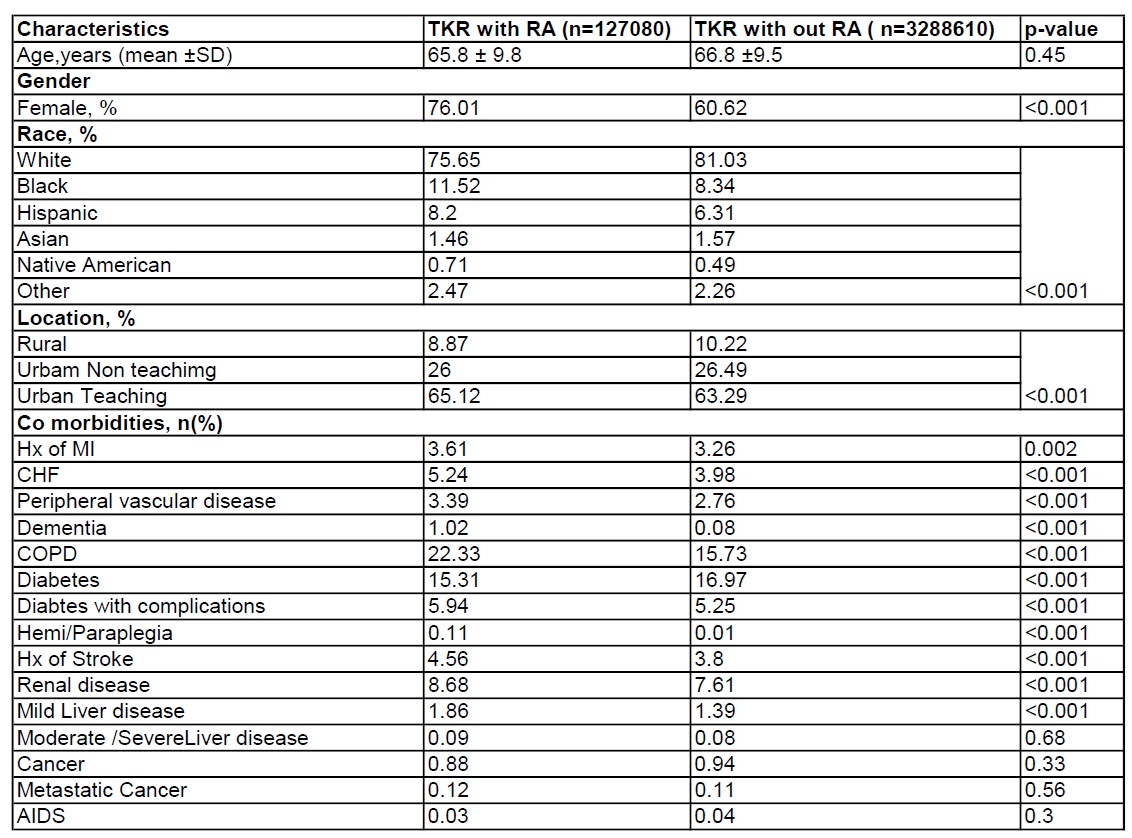Session Information
Session Type: Poster Session A
Session Time: 10:30AM-12:30PM
Background/Purpose: Rheumatoid arthritis (RA) is a chronic, inflammatory disease of the joints with an estimated prevalence of 0.5% of people. Nearly 25% of RA patients undergo joint replacement/arthroplasty within 22 years of diagnosis. The hip and knee are the most frequently replaced joints. Total knee replacement (TKR) effectively treats advanced joint destruction in RA patients, significantly enhancing mobility and quality of life. Other common TKR indications include symptomatic moderate-to-severe osteoarthritis, advanced symptomatic osteonecrosis with arthritis, and limb deformity correction. Studies on outcomes of TKR in RA patients are limited. This study uses the national inpatient sample (NIS) database to compare characteristics, comorbidities, perioperative complications, and outcomes in TKR patients with and without RA.
Methods: A retrospective cross-sectional study was conducted using data from NIS (2016-2021). Primary and secondary diagnoses were identified using International Classification of Diseases (ICD-10) codes. All patients aged >18 years undergoing TKR were included in the study. TKR patients with and without RA were compared for demographics, comorbidities, complications, and outcomes, including mortality, length of stay, and hospitalization charges. Statistical analysis was done using STATA v.17.
Results: A total of 3,415,690 patients underwent TKR during the study period. Patients with RA undergoing TKR (n=127080) were more likely to be female (76.0% vs 60.6%, p< 0.001) and non-White. The most common sites were urban teaching hospitals. RA patients had significantly higher prevalence of comorbidities; congestive heart failure (5.2% vs 4.0%), COPD (22.3% vs 15.7%), and renal disease (8.7% vs 7.6%) - and significantly more complications including blood loss anemia (19.0% vs 15.0%, p< 0.001), blood transfusions (3.0% vs 1.6%), peri-prosthetic infection (2.9% vs 1.5%), dislocation (1.26% vs 0.89%), fracture (0.81% vs 0.38%), and superficial surgical site infection (0.03% vs 0.01%). RA patients had higher postoperative mortality (0.08% vs 0.04%, p=0.003), longer hospital stay (2.54 vs 2.31 days, p=0.01), and higher hospital charges ($72,002 vs $67,185, p< 0.001).
Conclusion: This study found that RA patients undergoing TKR experience higher perioperative complications, prolonged hospitalization, and higher costs. The study also demonstrated that patients with RA undergoing TKR had more comorbidities, with no significant age difference between those with and without RA. These findings underscore the importance of preoperative optimization and vigilant postoperative care in this vulnerable population. More studies are required to accurately identify the outcomes and complications of the TNR in RA patients.
 Table 1: Patient characteristics and co-morbidities
Table 1: Patient characteristics and co-morbidities
.jpg) Table 2: Comparisons of complications between two groups
Table 2: Comparisons of complications between two groups
To cite this abstract in AMA style:
Shrestha k, Parajuli P, Regmi A, Subedi P, Ghimire M, Poudel S, Hasan M, Hashim M, Kurra V, Taoge C. Outcomes of Total Knee Replacement in Patients with Rheumatoid Arthritis: A National Inpatient Sample Database Analysis [abstract]. Arthritis Rheumatol. 2025; 77 (suppl 9). https://acrabstracts.org/abstract/outcomes-of-total-knee-replacement-in-patients-with-rheumatoid-arthritis-a-national-inpatient-sample-database-analysis/. Accessed .« Back to ACR Convergence 2025
ACR Meeting Abstracts - https://acrabstracts.org/abstract/outcomes-of-total-knee-replacement-in-patients-with-rheumatoid-arthritis-a-national-inpatient-sample-database-analysis/

.jpg)